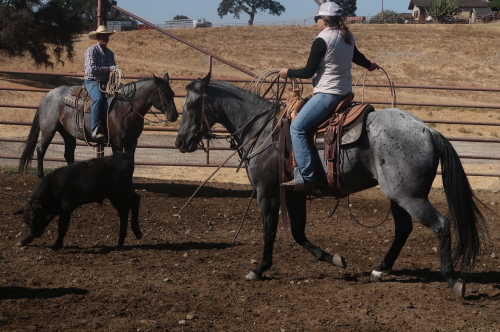A Lesson Learned: Boone's Bout with West Nile Virus

When Brooke Martin bought Boone, a five-year-old Quarter Horse, she was told that he had “received all his shots”. Assuming that meant the same vaccines that her cattle ranching family gives to all of their horses, she did not specifically ask which shots. She started to rope and brand off of Boone, who she described as a “good, quiet horse” and was excited to take him out for his first trip to gather calves.
When they arrived, he stumbled out of the trailer, but it seemed as though he had just crossed his legs and lost his balance. He was fine otherwise, until Martin got on to ride. As they rode out to gather the calves, Boone’s hind end fell out from under him a couple of times. He was transported to a local veterinary clinic, where neurological deficits became apparent. An infectious disease was suspected, so he was transferred to UC Davis.
“By the time we got down the road on our way to Davis, he had laid down in the trailer,” said Martin. “I was thinking, ‘I’ve only had this horse for four months and now something is really wrong’.”
Upon arrival at the UC Davis veterinary hospital, Boone’s clinical signs included muscle tremors, an agitated expression, weakness, ataxia, and dull mentation, which are fairly typical signs of West Nile virus (WNV) infection. The former owner was contacted, and it was discovered that Boone had received a five-way vaccine that spring, but no WNV vaccine. He was treated with anti-inflammatories, DMSO, and West Nile virus hyperimmune plasma, in addition to supportive care (IV fluid therapy, nutritional management, deep bedding). According to Dr. Gary Magdesian, who diagnosed this case, the prognosis for survival is approximately 67%. Fortunately, Boone could be counted in that number.
Boone spent some time recovering at the layup facility at the UC Davis Center for Equine Health, and then got to go home. “You guys got him through it,” said Martin of Boone’s experience at UC Davis. “I was really grateful.”
Today, Boone is happy, healthy, and back on track with his training. He shows no residual signs of his bout with WNV. He will receive regular WNV vaccinations, just like Martin and her family already do for the rest of their horses. She reflected that this has been an eye opening experience for all of them.
“Going forward, when we buy horses we’re going to make sure we ask exactly which shots they’ve had,” said Martin. “From one person to another, it’s not always the same.”
West Nile virus is a recommended core vaccine by the American Association of Equine Practitioners. “It is nationwide,” says Magdesian. “Every horse should be vaccinated annually as part of core vaccinations.”
West Nile Virus
West Nile virus is a mosquito-borne virus that affects humans and other animals, of which horses represent 97% of reported non-human cases. Introduced to the United States in 1999, WNV is now found in all of the contiguous 48 states. Wild birds are the natural hosts for WNV. The virus is only transmitted through mosquitoes; humans and horses cannot give it to each other. The best way to protect horses from WNV infection is by including a WNV vaccine as an annual core vaccine. It is also important to practice good mosquito control and minimize horses’ exposure to mosquitoes.
